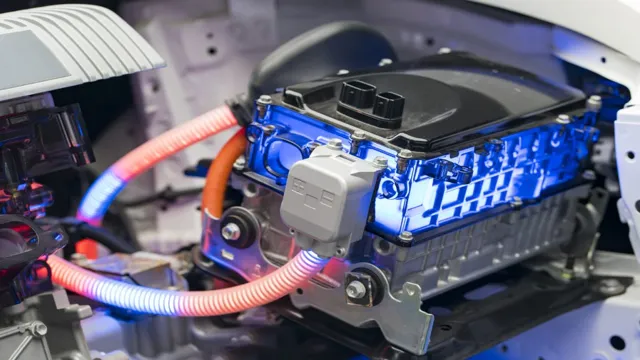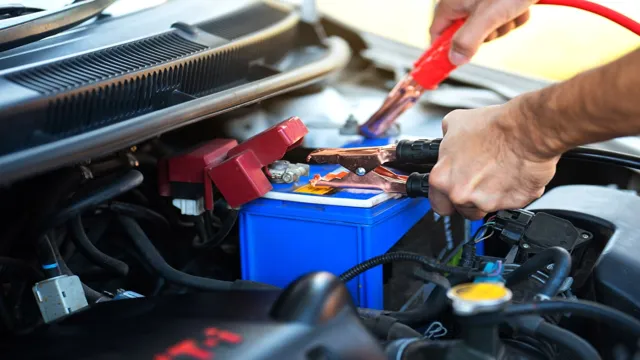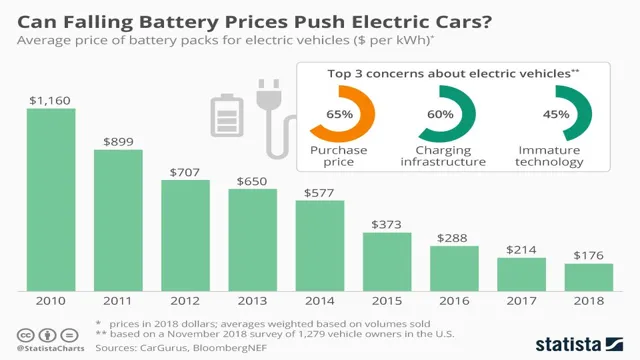Electric Cars with Defective Batteries: A Troubling Trend
Electric cars have been touted as the future of the automobile industry, offering sustainable transportation alternatives with lower carbon emissions. However, the deployment of electric cars has not been without challenges, with one of the most significant being defective batteries. Defective batteries in electric cars can pose numerous risks, including fire and explosion hazards, affecting both property and lives.
The problem has caused widespread concern among electric car owners and potential buyers who are anxious about the safety and reliability of batteries in electric cars. For this reason, it is essential to discuss the prevalence, causes, and solutions to defective batteries in electric cars to educate the public and address the issue.
What are Defective Batteries?
Defective batteries in electric cars can cause major problems for drivers and manufacturers alike. These batteries may fail to hold a charge, leading to limited driving range and frequent trips to the charging station. In some cases, the battery may even fail completely, requiring costly repairs or replacement.
Defective batteries can also be dangerous, posing a risk of fire or explosion. Manufacturers are constantly researching and improving their battery technology to prevent such incidents, but it’s important for electric car owners to stay informed and take appropriate precautions. Regularly checking the battery’s condition and performance, as well as following manufacturer guidelines for charging and maintenance, can help identify potential issues and prevent them from causing more serious problems down the road.
Understanding Battery Failure
Defective batteries can be a significant problem for electronic devices. A defective battery is one that does not function correctly due to manufacturing defects or damage during use. These batteries can fail to hold a charge, discharge too quickly, or even explode.
One common cause of battery failure is overcharging, which can lead to excess heat buildup and cause damage to the battery. Additionally, exposure to extreme temperatures, physical damage, or moisture can also cause a battery to fail. It’s essential to purchase high-quality batteries for your devices and follow any manufacturer instructions to ensure that your batteries last as long as possible.
Always be vigilant and check for any warning signs of a malfunctioning battery, such as bulging, leakage, or strange odors. By taking care of your batteries, you can keep your electronic devices running smoothly and avoid any hazardous incidents.

Facts About Defective Batteries in Electric Cars
Defective batteries in electric cars can be a big problem for drivers. These batteries might fail prematurely, have lower-than-expected performance, or even catch fire. Defective batteries can affect a car’s range, charge time, and overall usability, and may even lead to serious accidents.
For electric car manufacturers, defective batteries can lead to costly recalls, lawsuits, and damage to their reputation. It’s important to note that not all defective batteries are the same. Some may be the result of manufacturing defects, while others may be due to environmental factors such as extreme temperatures or irregular charging habits.
In any case, it’s crucial for electric car owners to monitor their batteries and take steps to prevent defects from occurring, such as following manufacturer guidelines for charging and maintenance. By doing so, they can enjoy the many benefits of electric cars while avoiding the risks of defective batteries.
The Risks of Defective Batteries
Defective batteries in electric cars can pose a significant risk to both the driver and the environment. When a battery goes bad, it can cause fires, explosions, and other accidents that can prove fatal. While electric vehicles have a much lower risk of such incidents compared to gasoline-powered cars, the use of large and complex battery packs in EVs means that even a small problem can have severe consequences.
Accidents involving defective batteries can be challenging to contain, primarily since fires and explosions can release toxic chemicals into the air, soil, and water. Safety regulators are continually working to ensure that batteries used in electric cars meet the highest safety standards. However, it’s essential to take steps to avoid defective batteries, such as regular maintenance, monitoring battery performance, and addressing any warning signs promptly.
In short, while electric cars do have the potential to revolutionize the automobile industry, manufacturers and drivers must take the risks associated with defective batteries seriously to ensure that these EVs are truly safe.
Causes of Battery Fires in Electric Cars
Electric car batteries have reportedly caused a few fires in the past. The risks associated with defective batteries are high. A defective battery may either overheat or short circuit, causing a fire.
As lithium-ion batteries are used in electric vehicles, the chances of a thermal runaway are high. A thermal runaway occurs when the battery temperature rises beyond the safe limit due to a spark, excessive charging, or a short circuit. In such cases, the temperature increases, leading to a fire.
It’s crucial to note that all batteries come with a risk, but regular maintenance, safety features, and investing in high-quality batteries can reduce the risk of fire. Electric car manufacturers are working tirelessly to improve battery technology and integrate safety features to minimize the risk of battery fires.
Statistics on Battery-Related Accidents
Battery-related accidents are a serious concern in today’s world. Statistics show that there has been an alarming increase in the number of these accidents, mainly due to the use of defective batteries. Defective and malfunctioning batteries can lead to several hazards, including explosions and fires, which can be fatal.
The risks associated with battery-related accidents are significant and cannot be ignored, especially when it comes to lithium-ion batteries used in various devices such as smartphones, laptops, and e-cigarettes. These batteries can generate an intense amount of heat if they are not manufactured correctly or subjected to malfunctioning. It’s crucial to be aware of the risks associated with these batteries and take precautions to prevent such incidents from happening, such as purchasing batteries from reputable sellers.
In conclusion, it is essential to understand the risks associated with the use of batteries and take necessary precautions to prevent accidents and keep the safety of ourselves and surrounding individuals intact.
Legal Implications for Auto Manufacturers
Auto manufacturers face significant legal risks when their vehicles are equipped with defective batteries. Not only can these batteries cause serious safety hazards to drivers and passengers, but they can also result in costly product liability lawsuits and damage to the manufacturer’s reputation. Defective batteries can lead to fires, explosions, and other dangerous malfunctions, putting drivers and passengers at risk.
In addition, auto manufacturers may be held liable for any resulting injuries or property damage. These risks highlight the importance of rigorous testing and quality control measures to ensure the safety and reliability of batteries used in automobiles. By investing in proactive measures, auto manufacturers can reduce the likelihood of defects and protect both their customers and their businesses.
Preventing Defective Batteries
Defective batteries in electric cars can be a serious problem that causes inconvenience and safety issues for drivers. One way to prevent defective batteries is to follow proper maintenance and storage guidelines. It’s important to keep the battery charged, not let it completely drain, and store it in a cool, dry place when not in use.
It’s also important to purchase batteries from reputable manufacturers and avoid purchasing counterfeit or cheap knockoffs. Additionally, it’s crucial to monitor the battery’s performance and address any problems or concerns immediately. Investing in high-quality batteries and keeping up with regular maintenance can go a long way in preventing defects and ensuring a safe and reliable driving experience.
Routine Maintenance for Electric Car Batteries
To ensure that your electric car battery remains in optimal working condition, routine maintenance is crucial. One of the most important aspects of battery maintenance is preventing defective batteries. One way to do this is by regularly checking the state of charge of the battery.
Low or high states of charge can lead to irreversible damage to the battery, resulting in a shorter lifespan. Additionally, keeping the battery at the right temperature is crucial. Extreme temperatures, whether hot or cold, can also damage the battery and reduce its lifespan.
By performing routine maintenance and ensuring that the battery is charged and stored properly, you can prevent defective batteries and prolong the life of your electric car battery.
Lithium-Ion Battery Care Tips
Lithium-ion batteries are a popular choice for many electronic devices due to their efficiency, reliability, and portability. However, they require proper care to prevent defective batteries that could endanger devices and users. One essential tip for caring for lithium-ion batteries is to store them in a cool and dry place away from heat and moisture.
Avoid exposing them to extreme temperatures and direct sunlight, which could cause them to degrade and lose their capacity. Additionally, it’s crucial to use the right charger for your devices and avoid charging them using third-party chargers or cables. Doing so could damage the battery and cause safety hazards such as swelling or overheating.
Lastly, it’s best to avoid overcharging or discharging the battery, which could lead to degradation and reduce its lifespan. By adopting these simple care tips, you can ensure your lithium-ion batteries stay functional and safe for extended periods.
Conclusion
In the world of electric cars, batteries are the heart and soul of propelling us into a sustainable future. But as with any technological advancement, there are bound to be a few bumps in the road. Defective battery issues have arisen and left some drivers feeling powerless.
However, we must remember that progress is never linear. It is through these challenges that we learn, grow and improve. So, let’s not throw in the towel just yet.
Rather, let’s charge forward with the determination to find better solutions and build a world where electric cars run with seamless efficiency. After all, as they say, the best way to predict the future is to create it.”
FAQs
What are defective batteries in electric cars?
Defective batteries in electric cars refer to faulty or malfunctioning batteries that could cause issues with the vehicle’s performance.
How can defective batteries in electric cars be identified?
Defective batteries in electric cars can be identified through symptoms such as reduced range, slower charging times, and frequent battery warnings.
What are the risks associated with defective batteries in electric cars?
The risks associated with defective batteries in electric cars include potential fires, reduced performance, and safety hazards for drivers and passengers.
What should owners of electric cars do if they suspect their batteries are defective?
Owners of electric cars should contact their manufacturer or dealership immediately if they suspect their batteries are defective, as this could pose a safety risk.




